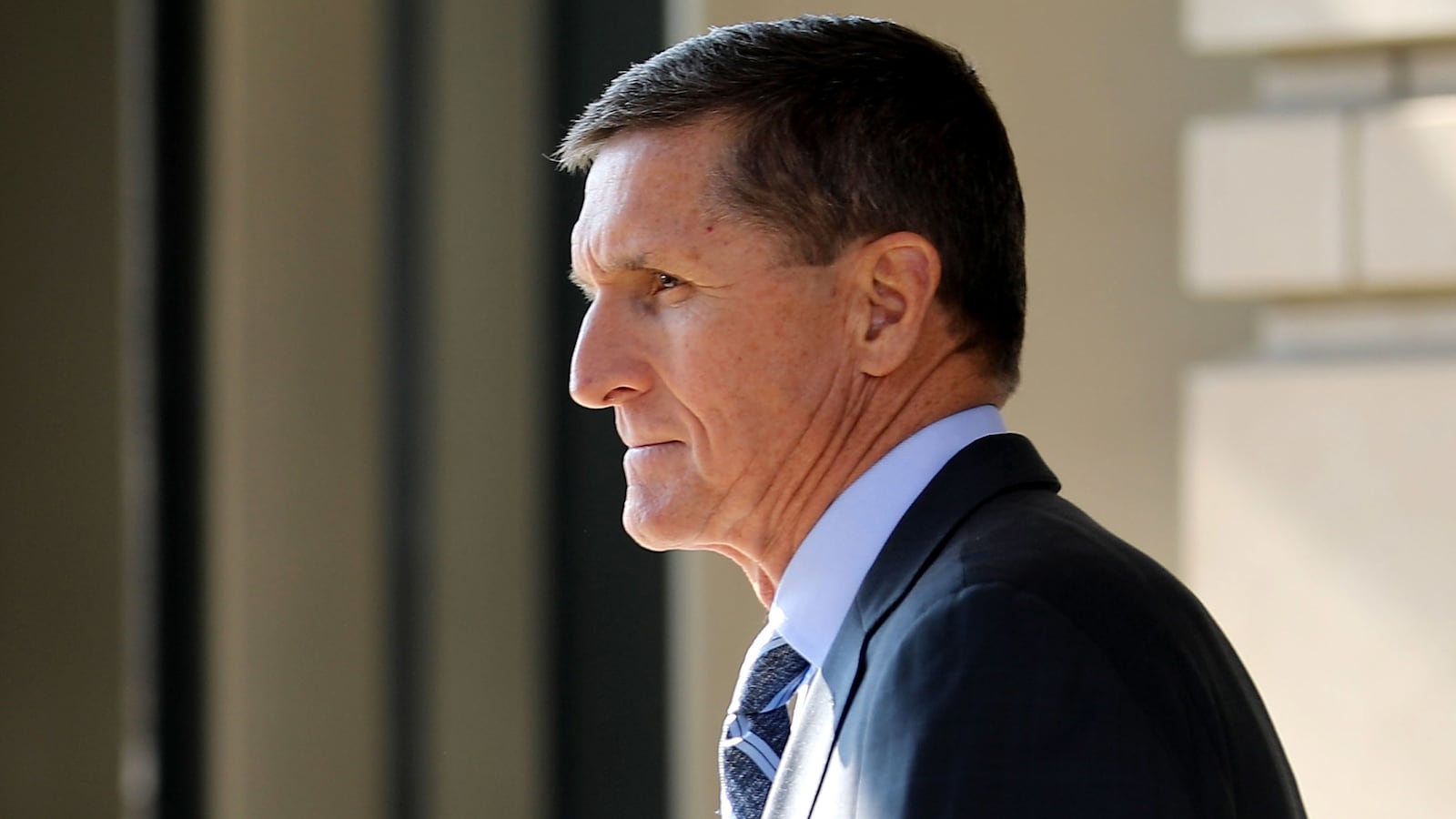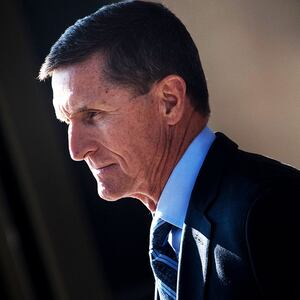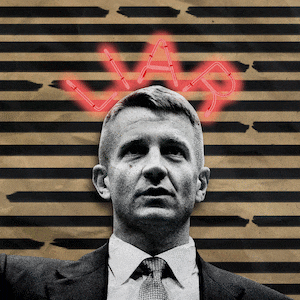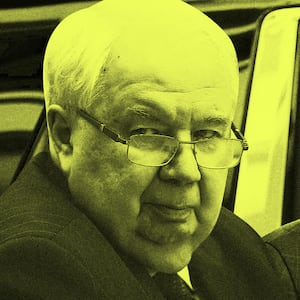When Donald Trump’s national security adviser-designate made his fateful phone calls with the Russian ambassador, the conversations that set in motion his downfall had a goal behind them. Drawing closer to the rival power that interfered in the 2016 election didn’t occur for its own sake, transcripts declassified on Friday show, but to create a new Mideast partnership against what retired Lt. Gen. Mike Flynn saw as “radical Islam.”
“You know that the strategic goal is stability in the Middle East,” the transcripts show Flynn pressing upon Sergey Kislyak on Dec. 23, 2016. “We will not achieve stability in the Middle East without working with each other against this radical Islamist crowd. Period. I am very adamant about that.”
Flynn would later plead guilty – and, later still, seek to reverse his plea – for lying to the FBI in January 2017 about the discussions of U.S. sanctions on Russia that he had with Kislyak on that day and others. But the calls, declassified by former acting Director of National Intelligence Richard Grenell and released under the auspices of confirmed successor John Ratcliffe, confirm an overlooked aspect of the Trump team’s early outreach to Moscow.
The reason why Flynn was keen for Moscow to tamp down its response to the Obama administration’s final round of sanctions was to advance a longstanding desire on Flynn’s behalf to unite the two nations against a dark vision of Islam that Flynn had come to hold. First on the agenda would be to come to terms on Syria, where both nations had deployed their militaries. It was something Flynn wanted the Pentagon to explore – and something that would lead to an encounter in the Seychelles between an infamous mercenary and the head of a sanctioned Russian fund.
Flynn has never particularly hid that he saw Russia as a means to the end of confronting what he variously refers to as “radical Islam,” “radical Islamist terror,” and “radical Islamic terror.” This was Flynn’s takeaway after his post-9/11 tenure as the intelligence chief for the Joint Special Operations Command, which made him an instrumental figure in the war on terror. To many of Flynn’s military and intelligence contemporaries, that is a hysterical and dangerous view of one of the world’s major religions.
At the Republican National Convention in 2016, he told Dana Priest of the Washington Post, “That’s really where I’m at with Russia. We have a problem with radical Islamism and I actually think that we could work together with them against this enemy. They have a worse problem than we do.” He would later put it in harsher terms, comparing Islam to a “malignant cancer” and calling it a “political ideology” that “hides behind this notion of being a religion.”
On the phone with Flynn in December 2016 – something surreptitiously intercepted by the FBI as a matter of course for the Russian ambassador’s conversations – Kislyak saw the leverage Flynn’s perspective provided.
Talking about Obama’s sanctions, which included the expulsion of Russian diplomatic and intelligence personnel, Kislyak told Flynn that the sanctions seemed to indicate the U.S. was unwilling to work together against “terrorist threats.” Kislyak added that he viewed Obama sanctions as aimed “not only against Russia, but also against the president elect.”
Flynn, urging Kislyak to convince Vladimir Putin to take a restrained approach to the sanctions, reiterated: “We definitely have a common enemy. You have a problem with it. We have a problem with it in this country and we definitely have a problem with it in the Middle East.”
But Flynn’s vision of the U.S. and Russia as natural allies against “Islam” overlooked much. Russia was aligned with Iran, to which it had sold powerful anti-aircraft defenses, while Flynn’s brief tenure famously put Iran “on notice” that the Trump administration would be aggressive against Tehran. Nor were the Russians concerned about ISIS in Syria. Their concerns were the survival of their client, Bashar Assad, and the transcripts indicate that Kislyak saw in Flynn’s outreach an opportunity to get Washington to acquiesce to Assad’s continued rule.
Their plan came to a head in a Dec. 29, 2016 call. According to the newly declassified transcripts, Kislyak tells Flynn that although Russia wants to work with the new administration on coordinating in the Middle East, it would stand back to wait and see what the Trump team proposed as policy.
“We had ... significant reservations about the idea of adopting now the principles for the Middle East … that our American colleagues are pushing for. So we are not going to support it to - in the quartet, or in the Security Council. And we have conveyed to our American colleagues,” Kislyak tells Flynn on the call. “So in the spirit of full transparency I was asked to inform you as well.”
But Kislyak offered a way forward: He tells Flynn that Russia’s Middle East advisors would be willing to work with a team of “specialists” from the U.S. on discussing new policies and ways to work together. But it would have to happen before the inauguration.
“Our specialist[s] on the Middle East say that they are very much interested in working with your specialists on these issues and if you're available - not you personally, but your specialists - are available even before the … President Elect ... has his inauguration on the twentieth. We are perfectly available,” Kislyak says. “But also, something more specific, we, … as you might have seen, are trying to help... the peace process in Syria.”
Two weeks later, Erik Prince, the former founder of Blackwater and an active contractor throughout the Middle East region, flew to the remote Seychelles island. In his testimony with Congress in 2018 during the Russia investigation, Prince told lawmakers that he had a chance meeting with a Russian banker. He said he didn’t know who he was and that he did not fly to the island to meet him.
But Robert Mueller’s report on that investigation showed Prince lied about much of his interactions with Kirill Dmitriev, the head of the Russiand Direct Investment Fund, one of Moscow’s sovereign wealth funds.
Dmitriev and Prince met in the Seychelles on January 11, 2017, at the Four Seasons Hotel in a bar overlooking the Indian Ocean. George Nader, a Lebanese-American businessman who advised the crown prince of the United Arab Emirates, was also present. The two discussed cooperation between the U.S. and Russia in the Middle East, particularly in Syria.
The Daily Beast previously obtained a memo Dmitriev sent after the meeting summarizing portions of his Seychelles conversation. The memo listed four potential areas of cooperation and called for an action plan to improve U.S.-Russian relations over a one year period.
The first bullet point proposed the U.S. and Russia work together on “military coordination and joint actions in Syria against ISIS.” It’s an idea that appealed to some of the most important players in the early Trump administration; Mike Flynn, Trump’s first and famously Kremlin-friendly national security adviser, pushed to expand U.S.-Russian military communications in Syria, a move that may have been illegal and which the Pentagon strenuously resisted as folly.
The idea, according to the memo, was to set up a “joint special forces mission where together the U.S. and Russia take out a key ISIS person or place or frees an area then announces it after.” Prince, for his part, has publicly supported the prospect of closer U.S.-Russia cooperation on counterterrorism.
The day after Prince meets Dmitriev in the Seychelles, Flynn speaks with Kislyak on the phone again, according to the transcripts. Kislyak inquires about whether Flynn had assembled a team to send to Astana, Kazakhstan to meet with the Russians about Syria. The U.S. never ended up sending a team. It’s unclear why.
All this would cost Flynn much. First, in February, he lost his job as national security adviser after he lied to Vice President Mike Pence about what his conversations with Kislyak concerned. Later, he would come under prosecution for his lies to the FBI – something Trump and his allies portray as getting railroaded by an out of control FBI and Robert Mueller, which has now led to the transcript’s declassification.
It’s the center of an ongoing legal battle, as a federal judge is resisting the Justice Department’s extraordinary decision to drop charges against a man who has pleaded guilty. And all of that has drifted far from the original geopolitical – in Flynn’s view, even civilizational – rationale behind Flynn’s secret colloquy with Kislyak.









